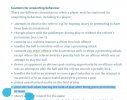I've just done this test and there was a question on it I can't work out the answer to even having had the opportunity to consult the book.
I can't remember the exact wording but the gist is that a player asks permission to leave the FOP, permission is granted, and before he's left the ball comes towards him and he kicks it away.
None of the answer options are 'play on'. What's the correct sanction (if any) and restart?
I can't remember the exact wording but the gist is that a player asks permission to leave the FOP, permission is granted, and before he's left the ball comes towards him and he kicks it away.
None of the answer options are 'play on'. What's the correct sanction (if any) and restart?




 . EDIT: just as good/bad question would be, what page is law 6 in the IFAB laws of the game?
. EDIT: just as good/bad question would be, what page is law 6 in the IFAB laws of the game? 
